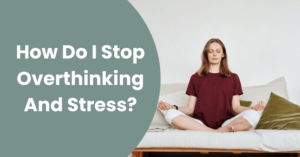Do you feel tired, stressed or in a low mood? Then it may be a sign of vitamin B deficiency – if you start taking vitamin B supplementation, you may boost both energy and mood.
Vitamin B supplementation can make you feel better if you have vitamin B deficiency. Our body needs vitamin B for the synthesis and repair of DNA, nervous system function, red blood cell formation, immune system and energy production. Vitamin B is not naturally stored in our body, so it must be obtained through diet and supplements. However, if we’re not getting enough nutrients in our diet, it may lead to vitamin B deficiency. Symptoms of vitamin B deficiency are such as fatigue, nervousness, irritability, disorientation, weakness, balance problems, weight loss, etc.
In order to address if vitamin B makes you feel better, we’ll go through the different types of vitamin B and what they do for women. We’ll also get into vitamin B deficiency and if they can help with anxiety.
Why Do I Feel Better After Taking B Vitamins?
You might feel better when you start taking vitamin B supplements if you’re deficient in vitamin B.
Vitamins B are a group of naturally occurring nutrients that are essential for a variety of bodily functions.
As these are water-soluble, your body is unable to store them. This means that you need to make sure your daily diet has an adequate amount of B-group vitamins.
B vitamins help in converting food into energy by facilitating the metabolism of carbohydrates, which are the main source of energy for our body.
Other bodily functions that require B vitamins include the synthesis and repair of DNA, nervous system function, red blood cell formation and immune system support.
There are 8 types of B vitamins and each has its own functions:
1. Vitamin B1 (Thiamin)
Thiamine plays an important part in facilitating metabolism by converting glucose into energy.
It also assists with nerve function by producing acetylcholine, a neurotransmitter, and by maintaining the protective coating around our nerves.
You can find vitamin B1 in foods like sunflower seeds, pork, legumes, yeast, and wheat germ.
2. Vitamin B2 (Riboflavin)
Vitamin B2, also known as riboflavin, is involved in the metabolism of carbohydrates, fats and proteins. It helps convert these nutrients into food.
It also serves as an antioxidant, protecting your cells from being damaged by harmful molecules called free radicals.
In addition, vitamin B2 supports the production of red blood cells and helps maintain skin and eye health.
Food such as meat, cheese, liver, kidney, leafy green vegetables and egg whites are sources of riboflavin.
3. Vitamin B3 (Niacin)
Unlike other B vitamins, niacin or vitamin B3 is stable in heat and you don’t have to worry when you’re cooking. You can find vitamin B3-rich content in foods like fish, chicken, nuts, mushrooms and eggs.
Vitamin B3 is vital for the production of NAD+, which is needed for a variety of cellular processes including the production and repair of DNA.
Research also suggests that vitamin B3 can help regulate cholesterol levels. It showed that individuals who took B3 supplements showed an increase in HDL, which is good cholesterol, and a decrease in levels of LDL, which is bad cholesterol.
4. Vitamin B5 (Pantothenic Acid)
Pantothenic acid, also known as vitamin B5, plays a part in the metabolism of nutrients and alcohol.
In addition, it assists in the production of red blood cells, reproductive hormones and stress-related hormones such as testosterone and cortisol.
Some good food sources that are rich in vitamin B5 include liver, meat, kidney, peanuts and legumes.
5. Vitamin B6 (Pyridoxine)
One of the main functions of vitamin B6 is to help your body break down protein and then use them for tissue growth and repair.
It also helps produce neurotransmitters, which are essential for transmitting signals between nerve cells.
You can find high amounts of vitamin B6 in green and leafy vegetables, fruits, fish and legumes.
6. Vitamin B7 (Biotin)
Biotin or vitamin B7 helps the enzymes in your body to break down nutrients to produce glucose, which is a sugar that supplies your body with energy.
You may have heard of biotin being referred to as the “beauty vitamin” as it plays a crucial part in maintaining healthy skin, hair and nails.
Biotin is present in a variety of food including egg yolk, seeds, sweet potatoes, spinach and nuts.
7. Vitamin B9 (Folate)
Vitamin B9 is more popularly known for its synthetic form folic acid. Not only does it support the growth and development of new cells but it helps the production of red blood cells.
In addition, it helps regulate homocysteine levels in the blood, which can reduce the risk of heart disease.
Your body can have a folate-rich diet by including foods like nuts, beans, fruits, and leafy green vegetables.
8. Vitamin B12 (Cobalamin)
You can primarily find vitamin B12 in foods like meat, fish, eggs, and some dairy products. It’s crucial to ensure your body has an adequate amount of vitamin B12 as it plays several important roles.
It not only helps in the production of red blood cells but also maintains the health of nerve cells.
Moreover, research has suggested that a lack of vitamin B12 can have an impact on our nervous system. Individuals with low levels of vitamin B12 showed signs of nerve damage, cognitive impairment and depression.
Even though many foods contain B vitamins, they easily get destroyed by heat during the cooking process. Therefore, it is essential to incorporate food that’s rich in B vitamins into your daily diet.
Another way of ensuring your body has an adequate amount of B vitamins is by taking supplements.
It may be better to take supplements if you’re having a B vitamins deficiency or require an increased amount than normal. This may be the case for women who are pregnant, adults with B vitamin deficiency and people who follow a vegan or vegetarian diet.
B complex vitamins serve a variety of functions and they might make you feel better by boosting your mood. Experts suggest that it may be useful for anxiety as well – but, is it really true?
Can B Complex Help With Anxiety?
Are you feeling anxious and overwhelmed often? Then B complex vitamins may help improve your mood and make you feel better.
According to research, vitamin B6 gives your body the nutrients necessary for the regulation of your mood, which as a result might prevent you from feeling anxious.
In addition, it’s suggested that vitamin B12 may help in lowering anxiety and depression levels.
Another study showed a 20% decrease in work-related stress in individuals that consumed high levels of B vitamins. The findings of the study suggest that the vitamins may be useful in improving mood.
Do keep in mind that B complex vitamins are not a cure for mental health conditions. However, they may be useful in boosting your mood and lowering anxiety levels if you’re vitamin B deficient.
Plus, generally speaking, B vitamins can be quite beneficial for feeling better in our bodies, especially for women.
What Does Vitamin B Do For A Woman’s Body?
Given that women’s bodies are constantly undergoing hormonal changes, B vitamins may be essential in regulating everyday bodily functions.
Four of the main benefits that B vitamins have for a woman’s body include:
- Prevents anemia
- Folic acid is essential for a healthy pregnancy
- Helps regulate stress hormones
- Reduces migraines
Let’s dive into it how vitamin B is beneficial for women…
1. Prevents Anemia
You may be surprised to discover that a staggering 30% of women between the ages of 15-49 globally suffer from anemia, which is caused by insufficient levels of iron in the body.
Vitamin B12 plays an important role in producing red blood cells, without which your tissues and organs would not receive adequate oxygen. It may weaken your body and lead to the development of anemia.
In addition, monthly blood loss due to menstruation makes women more vulnerable to anemia. Therefore, B vitamins, particularly B12, may be useful in ensuring your red blood cells remain healthy.
2. Folic Acid Is Essential For Healthy Pregnancy
Pregnant women can benefit from vitamin B supplementation, especially vitamin B9 or folate.
Folate is essential for the growth and development of our bodies. It can help prevent major birth complications related to the baby’s brain and spine.
The National Institutes of Health recommends pregnant women get around 600 mg of folic acid a day while breastfeeding mothers should get 500 mg a day.
Folate naturally occurs in leafy green vegetables, asparagus, brussels sprouts, oranges and nuts.
You can also use folic acid supplements. I would recommend you discuss the exact dosage with your doctor.
3. Helps Regulate Stress Hormones
Vitamin B5 serves as an anti-stress vitamin as it helps regulate the production of cortisol, a hormone released due to stress.
Cortisol plays an important part in various processes including the regulation of blood sugar, reduction of inflammation and stimulating metabolism.
A study showed that supplements with high levels of vitamin B can help reduce stress and mental fatigue.
4. Reduces Migraine
If you suffer from severe migraines, then vitamin B2 might be able to relieve the pain from the migraine.
Research has suggested that vitamin B2 or riboflavin can help decrease the frequency and severity of migraines. Plus, it’s been listed as a possible natural treatment for migraine by the National Institute of Neurological Disorders and Stroke.
Generally, the B complex vitamins ensure that your brain functions properly. It’s vital for the optimal physiological and neurological function of your body.
We’ve already discussed the benefits of B complex vitamins and how it can make you feel better, but how can you tell if your body has a lack of vitamin B?
How Do You Know If Your Vitamin B Is Low?
If you have vitamin B deficiency, it may be due to a lack of nutrients in your diet, chronic stress or excessive caffeine intake.
Also, if you follow a vegan or vegetarian diet, your body might not be getting an adequate amount of B vitamins. In that case, it may be a good option to use supplements to prevent or treat vitamin B deficiency.
Alternatively, it helps to maintain an overall balanced diet that suits the needs of your body. This means incorporating foods rich in vitamin B such as meats, nuts, legumes, fish and eggs.
In addition, excess consumption of alcohol can contribute to the depletion of B vitamins. Alcohol interferes with the absorption and utilization of vitamins in your body. It also prompts your kidneys to flush out B vitamins faster than usual.
High levels of stress have also been associated with a lack of B vitamins. Whether it’s related to work or relationships, stress can have an impact on your B vitamin levels, particularly those of B6 and B9.
For older women, menopause and postmenopause can lead to hormonal imbalance, which may lead to Vitamin B12 deficiency.
I would suggest checking out my eBook, Kickstart To Hormonal Balance if you want a detailed and easy guide to balance your hormones.
If you’re wondering about specific symptoms of vitamin B deficiency, listed below are some of the most noticeable symptoms.
- Vitamin B12
- Weakness
- Balance problems
- Weight loss
- Numbness in hands and feet
- Vitamin B6
- Depression
- Nausea
- Anemia
- Skin rash
- Vitamin B1 And B2
- Disorientation
- Cracks along the side of the mouth
- Vitamin B3
- Nausea
- Abdominal cramps
- Disorientation
- Vitamin B9
- Fatigue
- Irritability
- Headache
- Heart palpitations
- Open sores in the mouth
As a health coach, I am certified to help you get tested for B vitamin deficiency and I can help you find a diet and supplement plan – alternatively, you can get your vitamins- and minerals checked at your doctor.
Final Thoughts
If you’re one of many who suffers from vitamin B deficiency – or you’re not sure if you do, I’ll recommend you to check your vitamin and mineral status.
Also, vitamin B has a great impact on our mood, energy and how we feel in our body, so I’ll highly recommend you to take vitamin B supplementation.
Remember, vitamin B is not stored naturally in our body, which is why we need it through diet and supplementation.






